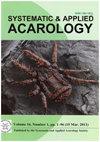swirskii(Acari:Phytoseidae)温度与发育速率的线性和非线性关系建模
IF 1.2
3区 农林科学
Q2 ENTOMOLOGY
引用次数: 0
摘要
摘要近年来,利用生物防治剂治理农业害虫受到了越来越多的关注,这有助于生产生物防治剂的公司的增长,包括捕食者和寄生蜂。作为温室中捕食性群落的一部分,斯维尔斯基黄颡鱼目前在全球范围内被用作对抗小昆虫和各种螨虫的生物防治剂,尤其是用来抑制二斑蛛(TSSM)——二斑叶螨(Tetranychus urticae Koch)的种群。为了提高雨燕的群体饲养水平并优化其在病虫害综合治理计划中的应用,在实验室条件下,在15-34(±1)°C、50±10%相对湿度和16:8(L:D)h光周期的七个恒定温度下测定了其发育速率。在34°C温度下没有孵化出任何卵,也没有观察到发育。为了确定捕食者不同阶段的较低温度阈值(T0)和热常数(K),使用了两个线性模型(普通模型和Ikemoto模型)。此外,还拟合了26个非线性模型来评估不同温度下的发育速率。通过普通(3.72°C和133.22DD)和Ikemoto(10.64°C和86.51DD)线性模型估计了整个未成熟阶段的较低温度阈值(T0)和热常数(K)。基于Akaike信息准则(AIC),描述卵、幼虫、原若虫和杜父期的温度依赖性发育速率的最佳模型是Ratkowsky模型,而对于整个成虫前期,则是Logan-6模型。我们的研究结果提供了对a.swirskii的热需求的详细评估,这对于提高这种螨在生物控制计划中的作用非常重要。本文章由计算机程序翻译,如有差异,请以英文原文为准。
Modeling linear and nonlinear relationship between temperature and development rate of Amblyseuis swirskii (Acari: Phytoseiidae)
Abstract In recent years, the utilization of biocontrol agents to administer agriculture pests has received more attention, which has conduce to an growth in companies generating biocontrol agents, including predators and parasitoids. Amblyseius swirskii Athias-Henriot as a part of predatory communities in greenhouses is currently used worldwide as a biocontrol agent against small insects and various mites, especially to suppress the population of the two-spotted spider mite (TSSM), Tetranychus urticae Koch. To improve mass rearing of A. swirskii and optimize its application in integrated pest management programs, its development rate was determined at seven constant temperatures ranging from 15 to 34 (±1)°C, 50±10% RH and a photoperiod of 16:8 (L:D) h under laboratory conditions. None of the eggs hatched at 34°C and no development was observed. To determine the lower temperature threshold (T0) and thermal constant (K) of different stages of the predator, two linear models (ordinary and Ikemoto) were used. In addition, 26 nonlinear models were fitted to evaluate the development rate at different temperatures. The lower temperature threshold (T0) and thermal constant (K) of total immature stages were estimated by the ordinary (3.72°C and 133.22 DD) and Ikemoto (10.64°C and 86.51DD) linear models. Based on the Akaike information criterion (AIC), the best model for the description of the temperature-dependent development rate of the egg, larval, protonymphal, and dutonymphal stages was the Ratkowsky model and for the whole pre-adult stage, it was the Logan-6 model. Our results provided a detailed evaluation of the thermal requirements of A. swirskii, which can be important in improving the role of this mite in biological control programs.
求助全文
通过发布文献求助,成功后即可免费获取论文全文。
去求助
来源期刊

Systematic and Applied Acarology
ENTOMOLOGY-
CiteScore
2.20
自引率
33.30%
发文量
152
期刊介绍:
Systematic and Applied Acarology (SAA) is an international journal of the Systematic and Applied Acarology Society (SAAS). The journal is intended as a publication outlet for all acarologists in the world.
There is no page charge for publishing in SAA. If the authors have funds to publish, they can pay US$20 per page to enable their papers published for open access.
SAA publishes papers reporting results of original research on any aspects of mites and ticks. Due to the recent increase in submissions, SAA editors will be more selective in manuscript evaluation: (1) encouraging more high quality non-taxonomic papers to address the balance between taxonomic and non-taxonomic papers, and (2) discouraging single species description (see new special issues for single new species description) while giving priority to high quality systematic papers on comparative treatments and revisions of multiple taxa. In addition to review papers and research articles (over 4 printed pages), we welcome short correspondence (up to 4 printed pages) for condensed version of short papers, comments on other papers, data papers (with one table or figure) and short reviews or opinion pieces. The correspondence format will save space by omitting the abstract, key words, and major headings such as Introduction.
 求助内容:
求助内容: 应助结果提醒方式:
应助结果提醒方式:


